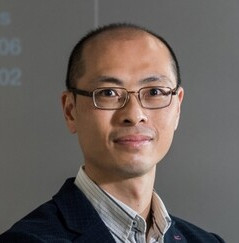Academic Staff

Professor WONG, Jason Wing Hon 黃永瀚
- BSc (Sydney), D.Phil (Oxon)
- Professor
- Cancer genomics
- Mutational processes
- Gene regulation
- Bioinformatics and computational biology
- Mass spectrometry
Our laboratory is interested in understanding how mutations occur in cancer and what effect this has on the way genes are used. Understanding the mechanism by which these mutations form in the genome is important because it can provide insights into why cancers develop and how they may be prevented. We are also interested in studying how mutations can alter the regulation of gene expression, particularly its effect on transcription factor binding at cis-regulatory elements. We work on all cancer types with cancer genomics data, but have a strong focus on skin cancers, blood
We are always looking for outstanding individuals with a keen interest in cancer research to join our lab. Some potential projects include:
- Direct detection of DNA lesions and non-canonical nucleotides using nanopore sequencing.
- Profiling the role of modified nucleotides in DNA mutagenesis.
- Exploring the origins of cancer through single cell RNA-seq.
-
Long read sequencing of transposable elements in cancer.
Full publication list: Google Scholar
- Lee S, Barbour JA, Tam YM, Yang H, Huang Y, Wong JWH (2025) LocusMasterTE: integrating long-read RNA sequencing improves locus-specific quantification of transposable element expression. Genome Biology 26(1):72
- Lee S, Ho YY, Hao S, Ouyang Y, Liew UL, Goyal A, Li S, Barbour JA, He M, Huang Y, Wong JWH (2025) A tumor necrosis factor-α-responsive cryptic promoter drives overexpression of the human endogenous retrovirus ERVK-7. J Biol Chem 301(6):108568
- Barbour JA, Ou T, Yang H, Fang H, Yue NC, Zhu X, Wong-Brown MW, Wong YT, Bowden NA, Wu S*, Wong JWH* (2024) ERCC2 mutations alter the genomic distribution pattern of somatic mutations and are independently prognostic in bladder cancer. Cell Genomics 4(8):100627
- Subramanian S, Thoms JAI, Huang Y, Cornejo P, Koch FC, Jacquelin S, Shen S, Song E, Joshi S, Brownlee C, Woll PS, Chacon Fajardo D, Beck D, Curtis DJ, Yehson K, Antonenas V, O'Brien T, Trickett A, Powell JA, Lewis ID, Pitson SM, Gandhi MK, Lane SW, Vafaee F, Wong ES, Göttgens B, Alinejad Rokny H, Wong JWH*, Pimanda JE* (2023) Genome-wide Transcription Factor binding maps reveal cell-specific changes in the regulatory architecture of human HSPC. Blood 142(17):1448-1462
- Lin J, Wu Y, Tian G, Yu D, Yang E, Lam WH, Liu Z, Jing Y, Dang S, Bao X*, Wong JWH*, Zhai Y*, Li XD* (2023) Menin 'reads' H3K79me2 mark in a nucleosomal context. Science 379(6633): 717-723
- Fang H, Yan HHN, Bilardi RA, Flensburg C, Yang H, Barbour JA, Siu HC, Turski M, Chew E, Xu Z, Lam ST, Sharma R, Xu M, Li J, Ip HW, Cheung CYM, Huen MSY, Sweet-Cordero EA, Majewski IJ*, Leung SY*, Wong JWH*, Ganciclovir-induced mutations are present in a diverse spectrum of post-transplant malignancies. (2022) Genome Medicine 14(1):124.
- Fang H, Zhu X, Oh J, Yang M, Barbour JA, Wong JWH (2021) Deficiency of replication-independent DNA mismatch repair drives a 5-methylcytosine deamination mutational signature in cancer. Science Adv 7(45) eabg4398.
- Zhu X, Fang H, Gladysz K, Barbour JA, Wong JWH (2021) Overexpression of transposable elements is associated with immune evasion and poor outcome in colorectal cancer. Eur J Cancer 157:94-107
- Fang H, Barbour JA, Poulos RC, Katainen R, Aaltonen LA, Wong JWH (2020) Mutational processes of distinct POLE exonuclease domain mutants drive an enrichment of a specific TP53 mutation in colorectal cancer. PLoS Genetics 16(2): e1008572
- Perera D, Poulos RC, Shah A, Beck D, Pimanda JE, Wong JWH (2016) Differential DNA repair underlies mutation hotspots at active promoters in cancer genomes. Nature 532:259-263
*(co-corresponding)
- General Research Fund (2025-2027) - Exploring the epigenetic role of genomic uracil in human cells (PI, HKD$1.55M)
- General Research Fund (2024-2026) - Functional characterisation of cancer hotspot mutations in XPD (xeroderma pigmentosum group D protein) (PI, HKD$1.6M)
- Health and Medical Research Fund (2023-2025) - Nanostring nCounter expression profiling of endogenous transposable elements as a biomarker of prognosis in colorectal cancer (PI, HKD$1.5M)
- Mainland-Hong Kong Joint Funding Scheme (2022-2024) - Rapid Long-Read Profiling of Genomic Structural Variants To Improve The Clinical Stratification of ALL (PI, HKD$1.1M)
- General Research Fund (2021-2023) - Using somatic mutational landscape to resolve the origin of hepatocellular carcinoma at the single cell level (PI, HKD$1.2M)
- Research Impact Fund (2021-2024) - Development and applications of a driver-dependent tumor organoid biobank for translational liver cancer research (Co-PI, HKD$4.1M)
- Collaborative Research Fund (2020-2023) - Integrative Chemical Biology Approaches to Decipher Histone Marks on H3K79 (Co-PI, HKD$ 6.5M)
- National Health and Medical Research Council Project Grant (2017-2019) - The role of somatic mutations in CCCTC-binding factor (CTCF) binding sites in cancer (PI: AUD$371,000)
- Cancer Researcher of the Year - Cure Cancer Australia Foundation (2016)
- Future Fellow - Australian Research Council (2014)
- Early Career Development Fellow - Cancer Institute NSW (2012)
- Vice-Chancellor’s Postdoctoral Fellow - University of NSW (2011)
- Government of Ireland Postdoctoral Fellow - Irish Research Council (2007)
- Jayne Barbour (Postdoc)
- Stephan Li (Postdoc)
- Qiuyu Jing (Postdoc)
- Alfred Chan (Research Assistant)
- Tamara Li (Research Assistant)
- Cherry But (Research Assistant)
- Mark Yang (PhD Student)
- Charles Lau (HKPF/HKU-PS PhD Student)
- Sojung Lee (PhD Student)
- Yucan Chen (PhD Student)
- Kelvin Wong (PhD Student part-time)
- Minghao Jiang (PhD Student)
- Elise Liew (PhD Student)
- Amy Ho (HKPF/HKU-PS PhD Student)
- Suyu Hao (PhD Student)
- Nick Choi (MPhil Student)
- Amos Lo (Technician)

